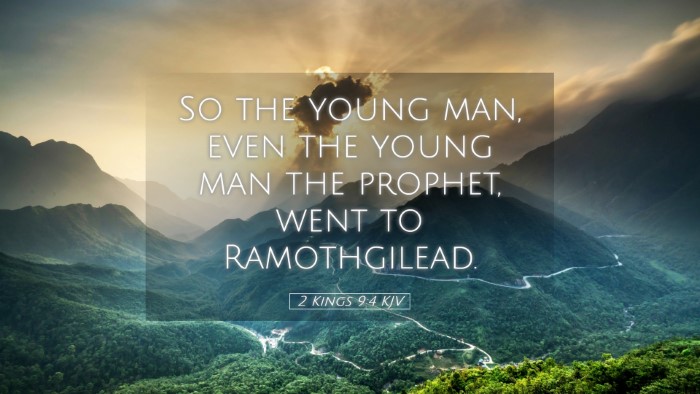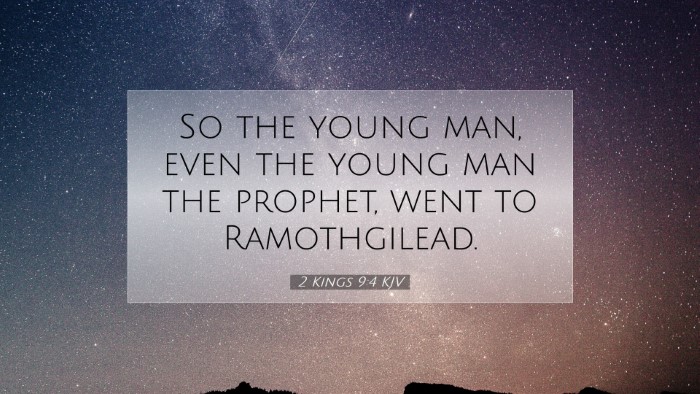Commentary on 2 Kings 9:4
Bible Verse: "So the young man, the servant of the prophet, went to Ramoth-gilead." - 2 Kings 9:4
Introduction
This verse occurs in a critical transition in Israel's history, marked by the anointing of Jehu as king over Israel, which signifies a turning point in God’s judgment against the house of Ahab. The narrative offers rich insights into God's sovereignty, the prophetic calling, and the unfolding of divine plans through willing servants.
Contextual Background
The context of 2 Kings chapters 9 and 10 illustrates the downfall of a corrupt dynasty. Jehu is anointed to fulfill the prophecy against Ahab's house, making this young man's mission instrumental in executing God’s judgment. This background is vital for understanding the significant yet humble role of the servant in God's grand narrative.
The Servant of the Prophet
Matthew Henry notes the importance of faithful servants in the fulfillment of God’s purposes. The young man, as a servant of the prophet, symbolizes humility and obedience. His willingness to undertake this critical task signifies the readiness of God's servants to act under divine command, irrespective of personal consequence. Henry emphatically states that the servant's actions demonstrate his fidelity and readiness to follow God’s directive.
Albert Barnes adds that the title “young man” reflects his youthful zeal and commitment. This emphasizes the principle that God often uses the humble and the lowly to accomplish His plans. This mirrors the New Testament revelation, where Jesus emphasizes that the greatest in the kingdom shall serve.
Adam Clarke expands further, commenting on the significance of the servant being sent. The act of sending indicates divine initiative in governance and the prophetic mission. Clarke notes, “The calling of the young man illustrates God's willingness to empower the unassuming.” The servant’s journey reflects a personal obedience to God’s call, which is a theme that resonates across biblical narratives.
Ramoth-Gilead: The Setting
Ramoth-Gilead, the location of the anointing, has strategic military significance and symbolizes the site where God's plan intersects with human history. Henry explains that this is not merely about the place but illustrates God's choice in removing ungodly leadership to restore righteousness.
Barnes reflects on the implications of geography in biblical narratives. Ramoth-Gilead serves as a stage for divine action, linking the spiritual and political realms. It reminds the reader that God’s rule encompasses not just spiritual matters but also the earthly jurisdictions of power.
The Thematic Elements
- Divine Sovereignty: The overarching theme articulated in this passage is the sovereignty of God who delegates authority and executes judgment through His chosen vessels.
- Obedience to God: The young man’s readiness to obey the prophet exemplifies the attitude of submission required of every believer who seeks to follow God’s will.
- Judgment and Restoration: Jehu’s anointing hints at God’s justice where idolatry and wickedness will face retribution, establishing the groundwork for future restoration in Israel.
Application for Pastors and Theologians
For pastors, this passage provides rich material for preaching on the nature of divine calling and the necessity of faithful service. It serves as a reminder that God often uses the unsuspecting to accomplish significant changes within His church and society. The young man in this narrative epitomizes the effective, faithful servant that God seeks even today.
Theologians may reflect on the themes of prophetic ministry and divine authority in governance. This passage opens discussions on God's providence through human agents, and how biblical narratives inform our understanding of leadership in the church.
Conclusion
2 Kings 9:4 presents a powerful message about God's purposes being fulfilled through His servants. The young man’s journey to Ramoth-Gilead represents an obedient response to God’s call and the intersection of divine authority with human action. In understanding this passage, readers are invited to reflect on their own roles as instruments of God's will in the world, embracing the call to serve without hesitation or fear of the consequences.


